An employee survey software is crucial for organizations seeking to gather meaningful feedback and insights from their workforce. The ideal tool should be user-friendly, customizable, and capable of collecting both quantitative and qualitative data. It should offer a range of question types, from multiple-choice to open-ended ones, and provide robust analytics to help managers interpret results.
To find the best employee survey tools, we evaluated different software solutions and narrowed our list down to our top five recommendations:
- Zoho Survey: Best overall employee survey with advanced features
- ClickUp: Best for affordability
- SurveyMonkey: Best for category-based surveys
- Connecteam: Best for companies with on-the-go teams
- monday.com: Best employee survey tool with project management features
Top Employee Survey Tools Compared
Aside from having different types of surveys that support the employee life cycle, the employee survey tools we evaluated in this buyer’s guide all have automatic survey scheduling, data visualization, and premade templates for easy survey creation. All, except SurveyMonkey, also offer a free plan; however, monday.com’s free version is limited to two users only, while Connecteam’s limit is ten people.
Here’s a table that presents their standout features:
Starter Monthly Pricing | Skip Logic/Conditional Formatting | Standout Features | Overall Rating | |
|---|---|---|---|---|
 | $35/month | ✓ |
| 4.75/5 |
 | $10/user/month | ✓ |
| 4.39/5 |
 | $25/user/month | ✓ |
| 4.36/5 |
$35/month for the first 30 users | ✓ |
| 4.30/5 | |
 | $12/user/month | ✕ |
| 4.20/5 |
Zoho Survey: Best Overall with Advanced Features

Pros
- Advanced features for more complex surveys
- 250-plus customizable templates
- Multilingual surveys supported
Cons
- Additional fee to gather more responses
- Limited third-party integrations
- No action planning features
Overview
Who should use it:
Zoho Survey is ideal for organizations that need to create complex surveys because of its advanced features like skip logic, which allows you to direct respondents to different sections of the survey based on their answers. One example where it’s often used is confirming the employee’s understanding of HR policies and compliance requirements. If the answer is yes, they can proceed to the next section. On the other hand, they cannot move forward if the answer is no. More so, Zoho Survey is also ideal for businesses with global employees or customer base because of its capability to create multilingual surveys.
Why we like it:
I like its capability to create unique URLs, which prevents respondents from answering the same survey twice. It also has 25-plus survey question types to choose from, including multiple-choice, rating scale, and open-ended questions. The tool also offers custom branding, response notifications, and real-time reporting to help users gather insights efficiently and reduce manual data analysis.
Free version: Unlimited surveys and survey templates, but limited to 10 questions and 100 responses per survey.
Plus ($35/month): Unlimited questions and 3,000 responses per month, survey and response customization, third-party integrations, and downloadable reports
Pro ($49/month): Everything in Plus plan + 5,000 responses/month, multilingual surveys and reports
Enterprise ($109/month): Everything in Pro plan + 7,000 responses/month, SSO, and personalized training and onboarding
*Zoho Survey’s free, Plus, and Pro plans are limited to one user only—you can’t purchase additional users. Only the Enterprise plan has three users per account and allows additional users.
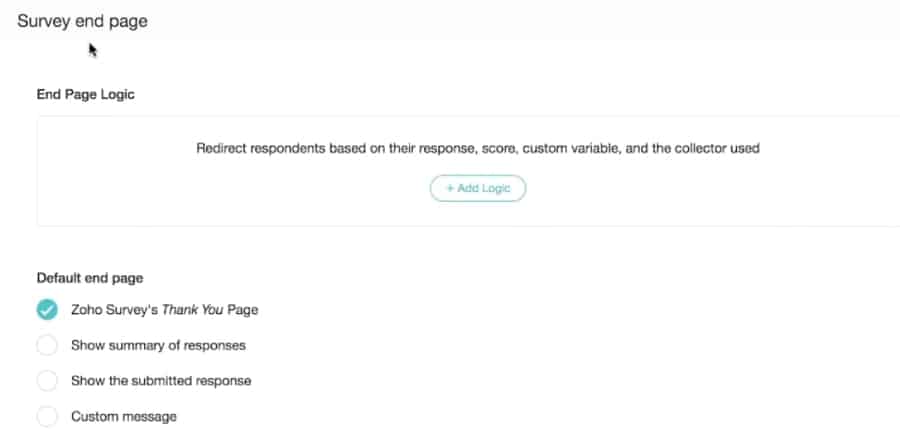
The skip logic feature allows you to further personalize your questions per user. (Source: Zoho Survey)
- Zoho Survey offers support for more than 70 languages, even those that are right-to-left script (i.e., Hebrew and Arabic). This allows organizations (especially those with international employees or multiple global entities) to create surveys in various languages and collect responses from a diverse group of employees.
- Receives responses from a device even without internet connectivity and automatically uploads them when you’re back online.
- Its automatic scheduling allows you to automatically send your survey, streamlining the distribution process. It also ensures timely delivery and increases your response rate.
ClickUp: Best for Affordability

Pros
- No user limit in the free version
- Costs less than competitors
- 10-plus ways to view data and progress reports
Cons
- Steep learning curve
- No anonymous surveying features
- Not an HR or survey-focused platform
Overview
Who should use it:
ClickUp is ideal for businesses that are on a budget because it has a free plan with an unlimited number of users. This gives you access to five free types of survey templates, including employee engagement and employee satisfaction surveys. If you want to access other survey types, you can upgrade to any of ClickUp’s higher-tier plans, which are also priced low. It also has a document sharing feature, which makes it easier to share and view any document in real time.
Why we like it:
ClickUp allows you to create, customize, and distribute forms easily as it integrates seamlessly with task and project management. This also allows you to track responses and actions as well as analyze feedback efficiently, making it faster to address employee needs promptly.
Free version: Has collaborative docs, whiteboard, 100MB storage, real-time chat messaging
Unlimited ($10/user/month): Everything in free + native time tracking, email in ClickUp
Business ($19/user/month): Everything in Unlimited + workload management, mind maps, goal folders, etc.
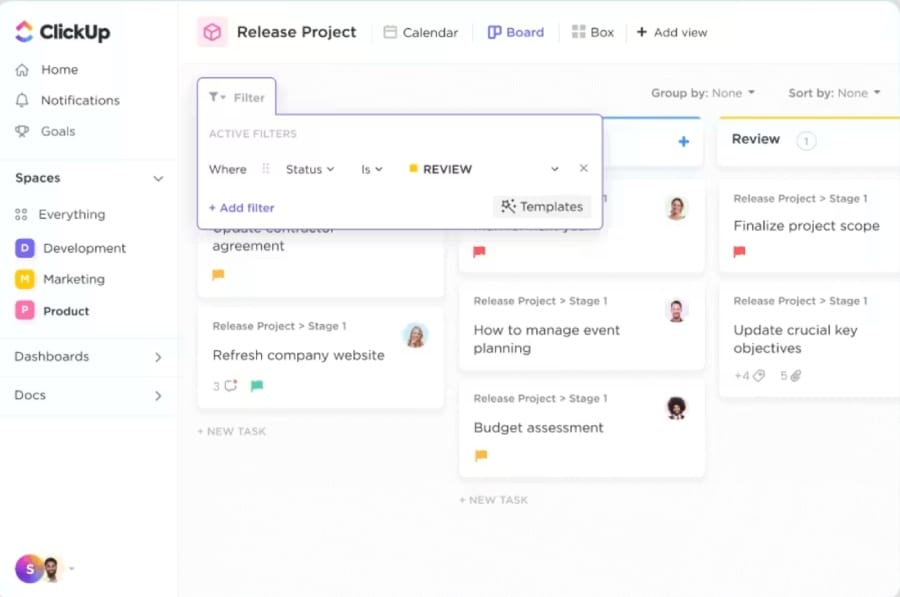
ClickUp has a drag-and-drop interface, which allows you to change tasks and statuses. (Source: ClickUp)
- ClickUp has integrated document creation and collaboration tools, enabling teams to create, share, and edit documents within the platform.
- It leverages trigger-based automation to streamline repetitive tasks and then sends reminders or completion notifications to keep users up-to-date.
- Offers multiple views like list, board, chart, and Gantt, allowing users to visualize tasks and projects.
- Facilitates goal setting and progress tracking with features for defining objectives, key results, and milestones. These features make ClickUp a great tool for gathering employee feedback and executing action plans via goal planning and monitoring.
- ClickUp’s free plan also allows unlimited users and has 24/7 customer support.
- Its resource management feature serves as a hub where you can place, manage, and track time, personnel, and company assets across projects. It has visual tools to help you plan easily and prevent overallocation.
- AI-powered reporting automatically generates follow-up questions or suggests action items based on survey results.
SurveyMonkey: Best for Category-Based Surveys

Pros
- Wide range of templates for different industries
- Wide variety of questions by category, such as demographics, events, education, etc.
- Easy to use
- Automatic results summaries
Cons
- Limited advanced features, like geotagging and matrix star rating surveys
- Limited customization options in terms of branding and design
- Annual billing of team plans, starting at three users
Overview
Who should use it:
SMBs and large enterprises can benefit from SurveyMonkey for its wide range of survey types that are ideal for conducting market research, gathering customer feedback, and measuring employee satisfaction. This can drive informed business decisions and enhance overall employee performance.
Why we like it:
Aside from its capability to create multilingual surveys, I love SurveyMonkey’s Question Bank, a repository of prewritten questions within different categories or industries—from HR to healthcare. This is available even to those under a free plan. It is perfect for businesses that have limited HR personnel because they can just create surveys with just a few clicks. Plus, these questions can be tailored to make them more specific to your brand.
Free Version: Access to unlimited surveys but up to 10 questions per survey only.
Team Plans*
- Team Advantage ($25/user/month): Access to unlimited surveys and questions, multilingual surveys, and survey branding.
- Team Premier ($75/user/month): Everything in Team Advantage + access controls, team collaboration, premium themes, custom survey URL.
- Enterprise (custom pricing): Everything in Team Premier + SSO, unlimited API, and a delegated customer success manager.
Individual Plans
- Standard ($99/month): Access to unlimited number of surveys and questions, 1,000 responses/month, data export, and skip logic.
- Advantage** ($39/month): Everything in Standard + multilingual survey, custom survey URL, custom logo, and data exports.
- Premier** ($119/month): Everything in Advantage + white label surveys, 40,00 responses a year.
*SurveyMonkey’s Team plans start at a minimum of three users
**Plans are billed annually.
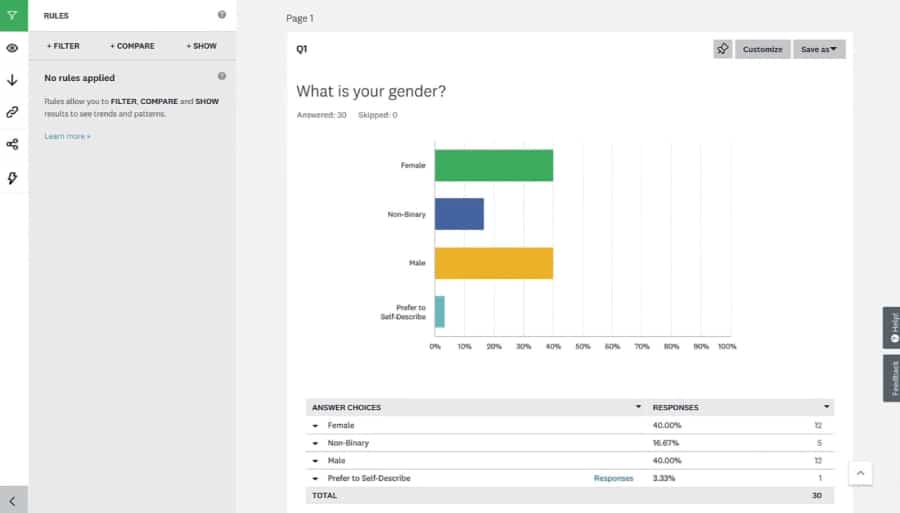
SurveyMonkey gives you a graphic summary of all the responses to help you analyze data better. (Source: SurveyMonkey)
- SurveyMonkey has an extensive question library with 1,000-plus prewritten questions and answers. You can use them in any survey type, including multiple-choice, rating scales, and open-ended questions. Users can also add images and videos to their surveys for a more engaging and interactive experience.
- SurveyMonkey allows you to send survey invitation links and collect responses via different methods, such as QR codes, web links, emails, or social platforms. This ensures that the survey gets to the right people in any way possible.
- SurveyMonkey’s analytics and reporting features help users analyze survey data and gain insights. The platform provides real-time results and allows users to export data into various formats, such as Excel or PDF, for further analysis or presentation.
Connecteam: Best for Companies with On-the-Go Teams
Pros
- Real-time results of surveys
- Different data visualizations
- Surveys can be sent via email, chat, or mobile
- Accessible on-the-go
Cons
- Limited survey and question types
- No auto-scheduling or forecasting
- Limited integrations
Overview
Who should use it:
As a mobile-first employee survey tool, Connecteam is perfect for organizations that have remote teams or field workers. Its geolocation feature shows you where the survey takers are from in real time. This gives managers a targeted analysis of employee feedback based on different office locations or regions. It can also help identify local issues, compare engagement levels across sites, and tailor initiatives to address location-specific challenges or opportunities.
Why we like it:
While most of the employee survey tools on this list have a mobile version, only Connecteam is optimized for mobile devices both in terms of design and functionality. It has mobile-specific features, such as push notifications and geolocation. Push notifications boost your response rates because participants are prompted to complete surveys in a timely manner. It also improves engagement because they keep participants connected to the survey process.
Free Version: Access to all hubs and features but limited to 10 users only.
Basic ($35 for first 30 users, $0.6/additional user/month): Access to surveys, insights, 5GB of storage.
Advanced ($59 for first 30 users, $1.8/additional user/month): Access to live poll posts, team chats, custom publishing, 5GB of storage.
Expert ($119 for first 30 users, $3.6/additional user/month): Access to media file attachments, preschedule posts, custom work contacts.
Enterprise (custom pricing): Unlimited access to all features.
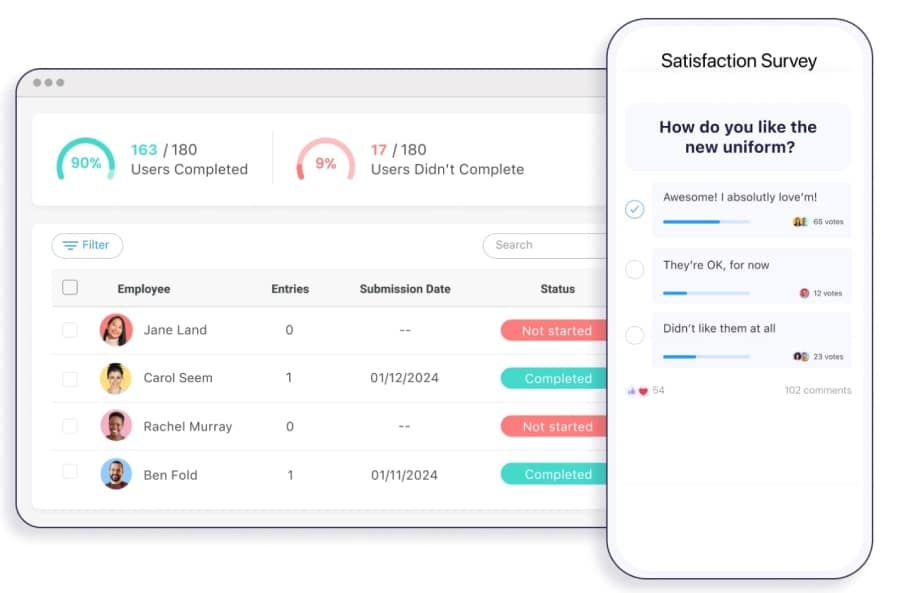
You can create pulse surveys with just a few clicks on Connecteam. (Source: Connecteam)
- Connecteam provides real-time results, allowing you to see responses as soon as they are submitted. This enables you to quickly identify trends and areas of concern, and take action to address them.
- You can set automated reminders to ensure that employees complete the survey in a timely manner.
- Connecteam’s surveys can be distributed in multiple ways, including via email, push notification, or through the app itself. This allows you to reach employees wherever they are, and ensure that they have easy access to the survey.
monday.com: Best Employee Survey Tool with Project Management Features

Pros
Cons
- Limited customization options in survey forms
- Learning curve at the beginning
- Primarily a project management software; thus lacking features of a full surveying software
Overview
Who should use it:
monday.com is best used by teams and organizations that need a simple yet versatile project management platform with employee survey tools. monday.com offers customizable templates for easy employee feedback collection. Teams can then use its data visualization tools, like charts and graphs, to get a quick analysis of survey results. Furthermore, its automation features can streamline follow-up actions based on survey responses.
Why we like it:
While monday.com is primarily a project management software, it can also assist with various HR processes like employee onboarding, training, and performance management. In the context of employee onboarding, for example, you can create customized onboarding checklists, assign them to different members, track the progress of each new hire’s onboarding, and store documents and resources. After that, you can set automated notifications to ensure nothing falls through the cracks. This also facilitates transparency and accountability at each point, enabling managers to identify bottlenecks, track projects, and allocate resources effectively.
Free Version: Allows up to two members; access to three boards, unlimited docs, and 200-plus templates
Basic ($12/seat/month): Access to everything in the Free version + 5GB file storage and prioritized customer support
Standard ($14/seat/month): Access to everything in Basic + automation and integrations
Pro ($24/seat/month): Everything in Standard + access control, time tracking, and 20GB of file storage
Enterprise (custom pricing): Unlimited access, 1,000GB of file storage, reports, and analytics
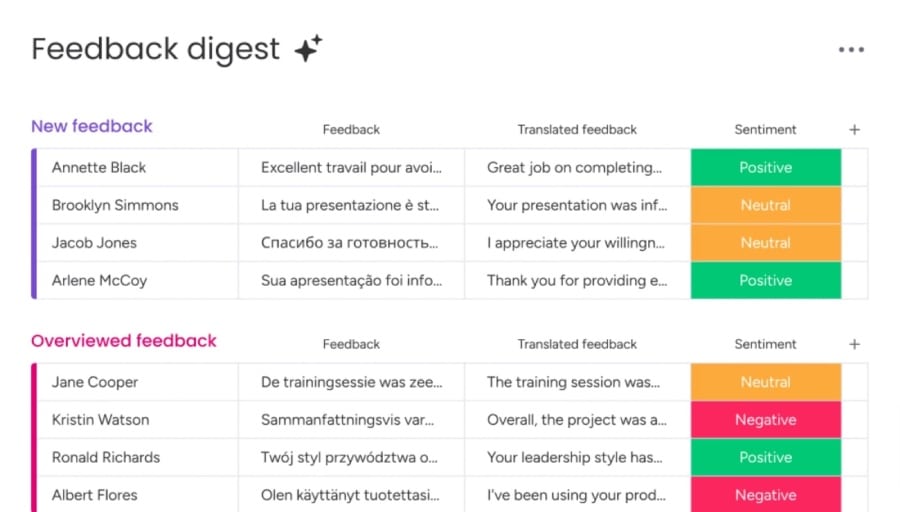
monday.com’s feedback gallery gives you insights into employees’ feedback. (Source:monday.com)
- Its powerful automation capabilities allow you to create custom workflows and automate repetitive tasks, reducing the need for manual work and increasing team productivity. Take note, however, that automation features are only available in the Standard, Pro, and Enterprise plans.
- Its highly visual platform enhances survey implementation and analysis through a versatile board system and form view for each survey creation and distribution. As responses are collected, they automatically populate the board, allowing for real-time data visualization. Its filtering, sorting, and collaboration features enable teams to identify patterns, discuss insights, and prioritize feedback efficiently.
- monday.com integrates with more than a hundred other apps and tools, including Gusto, Stripe, and Slack. This helps you easily connect it to the existing apps you already use, streamlining your workflow.
How to Choose the Best Employee Survey Tools
Selecting the right employee survey software is crucial for organizations aiming to effectively gauge and improve employee engagement, satisfaction, and overall workplace culture. The ideal tool should not only simplify the process of creating, distributing, and analyzing surveys but also provide deep insight that drives meaningful action and positive change.
Here are some tips for choosing the best employee survey tools for small businesses:
- Prioritize ease of use: A user-friendly interface is crucial for both administrators creating surveys and employees taking them. Look for tools with drag-and-drop functionality, premade templates, and mobile responsive designs. The easier the tool is to use, the higher the participation rates will be, leading to more comprehensive and actionable data.
- Look for robust analytics: Advanced analytics capabilities help you get meaningful insights from survey data. Seek tools that offer real-time reporting, customizable dashboards, and the ability to segment data by demographics or departments. Features like sentiment analysis for open-ended responses and benchmarking against industry standards can provide deeper insights into your workforce.
- Ensure customization options: Every business has unique needs, so flexibility is key. The best tools allow you to customize survey questions, response scales, and overall design to align with your company culture. They should also offer options for different survey types (pulse surveys, 360-degree feedback, exit interviews).
How We Evaluated the Best Employee Survey Tools
We evaluated some of the most popular employee survey tools, comparing each product’s pricing, ease of use, and online user reviews. We also looked at the essential features of a survey tool, such as customization, data collection, and reporting.
To see our full evaluation criteria for the best employee survey tools, click through the tabs in the box below:
25% of Overall Score
The best employee survey tools should have customization to reflect an organization’s branding. It should also have customizable premade templates for the nontech-savvy users.
25% of Overall Score
We looked at the types of surveys each employee survey software provides. These surveys should not be limited to pulse surveys but also surveys for each employee life cycle, from onboarding surveys to exit interviews.
15% of Overall Score
This criterion focuses on the tool’s capability to export and download data in various file formats. We also considered the tool’s ability to answer surveys anonymously.
10% of Overall Score
An employee survey tool with 24/7 customer support and offline accessibility is a must. We also checked if they have automatic follow-ups and mobile accessibility.
20% of Overall Score
We checked to see if the software solution has a free version or free trial period and transparent pricing for its paid plans. We also considered if the paid plans are affordable for small businesses.
5% of Overall Score
We consider online user reviews from the top third-party review sites, where any options with an average of 4-star ratings are ideal. The employee survey tools with more than a hundred reviews are preferred.
Frequently Asked Questions (FAQs)
The frequency of the surveys depends on your organization’s goals and culture. Many companies conduct comprehensive annual surveys, supplemented by shorter pulse surveys on a monthly or quarterly basis to track ongoing sentiment and address specific issues.
Most reputable survey tools, like the ones on this list, offer built-in anonymity features. These may include gathering data only when a minimum number of responses have been received, using randomized identifiers instead of names, and allowing employees to opt out of demographic questions that could potentially identify them.
The most common types of employee surveys are as follows:
- eNPS: It measures employee satisfaction by asking how they are likely to recommend their workplace to others
- DEI surveys: They evaluate employees’ perceptions and experiences related to workplace diversity, fairness in opportunities, and feelings of belonging.
- New hire: These are given to new employees to assess their onboarding experience.
- Employee wellbeing: These surveys focus on assessing employees’ physical, mental, and emotional health.
- Pulse surveys: These are short, quick surveys.
Bottom Line
Employee survey tools are essential for any company looking to improve employee engagement and productivity. By gathering feedback from employees on a regular basis, companies can identify areas for improvement, measure progress, and make data-driven decisions to create a positive work environment.
The best employee survey tools offer customizable features, real-time feedback, and anonymity to encourage honest and candid feedback. In our evaluation, we found Zoho Survey as the best employee survey tool because it offers a wide range of premade, customizable survey templates and questions. It also has advanced reporting and multilingual support, which enables businesses to gain deeper insights across diverse teams.